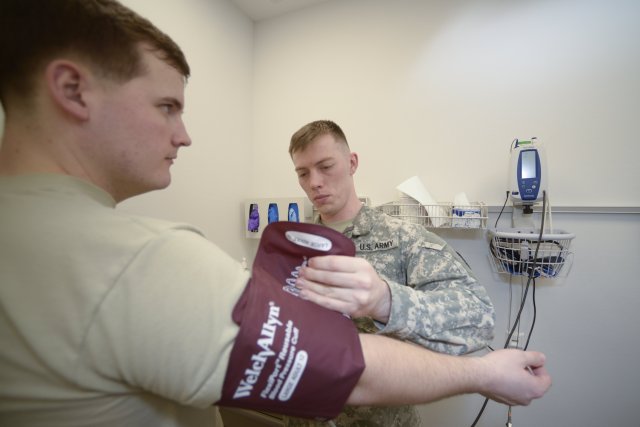
By Robyn Mack
USAG Stuttgart Public Affairs Office
February is American Heart Month. The annual observance is a time for people to take an assessment of their heart health practices, and reconfirm or make changes to their routines.
According to the Centers for Disease Control and Prevention, “cardiovascular disease is the leading cause of death in the United States; one in every three deaths is from heart disease and stroke, equal to 2,200 deaths per day.”
“Health, and more specifically heart health, is affected by our lifestyle choices,” said Lt. Col. (Dr.) Patrick Contino, U.S. Army Health Clinic Stuttgart medical director. “When we look at heart disease, we want to address the risk factors that are modifiable and within our control.”
Those modifiable risk factors include: exercise, diet, smoking, blood pressure, alcohol use, and weight.
“You might be doing well in one of these areas, but the error is when you ignore other modifiable risk factors,” the doctor explained. “If you’re hitting the gym every day, but not addressing the other modifiable risk factors, you can be interfering with the balance your body needs.”
Contino recommends taking a look at your lifestyle and addressing the “low-hanging fruit” risk factors for heart disease that are easily addressed.
Exercise
“Activity should be regular and start from early school age and continue throughout life,” Contino said. The recommended amount of activity is 150 minutes per week, with at least 75 minutes being vigorous. “Vigorous exercise is reached when you are at 85 to 95 percent of your maximum heart rate. There are charts online to help you determine your heart rate to achieve the vigorous range.”
“I like to advise 30 minutes of exercise most, if not all, days of the week.”
Diet
Many health practitioners recommend the “Mediterranean diet” for heart health. This diet is high in veggies, nuts, legumes, olive oil, fruits, and fish low in mercury content, said Contino, who also serves as a host to the Armed Forces Network “Ask the Doctor” segment on 102.3FM.
Smoking
“Smoking is the leading cause of premature death,” Contino said. “Quitting has benefits as quickly as within days of stopping use. The Stuttgart Army Health Clinic, in concert with the Panzer Dental Clinic, Army Public Health Nurse, and the Army Wellness Center have started a pilot program to assist you in helping to stop using tobacco products.”
Blood pressure
“There are a lot of factors that contribute to hypertension,” Contino said. “Gender, genetics, excess weight, stress, and even some medication.” High blood pressure is when the top number in your blood pressure screening is 140 or greater, and/or the lower number is greater than 90. “People also need to be mindful of prehypertension – watching closely if those numbers get near the area of concern.”
Contino also said table salt should be used in moderation when considering healthy blood pressure levels.
Alcohol use
“If you don’t drink, we’re not going to recommend you start,” joked Contino, “but, for those that do, it’s a recommendation of one serving of alcohol per day for women and two for men.”
Serving sizes are:
- 12 fluid ounces of regular beer
- 5 fluid ounces of table wine
- 5 fluid ounces of spirits
“However, you don’t get to average that out,” the Army doctor said. “If you go out drinking one night with friends and have 6 to 7 drinks – that’s considered a binge. A single binge of six drinks per week carries a higher risk of sudden death. Decreasing alcohol consumption to a light or moderate level, as recommend, has been shown to decrease the risks of heart disease by up to 70 percent.”
Weight
“Obesity increases all of your risks; and the risks, if not kept in check, can affect your weight. It’s important to work with your provider to find the right balance. We also have a nutritionist on staff available for consultation to help get you on the right track if you carry excess weight,” he said.
“Getting heart healthy is unique to every individual,” Contino said. “If you’re looking for the exact recipe, you won’t get it here. But taking action to reduce risks, and seeking help when needed, will put you on a path toward positive overall health.”
For more information on services offered at the Stuttgart Health Clinic, visit: http://rhce.amedd.army.mil/stuttgart/ or submit your questions for Dr. Contino to be answered during “Ask the Doctor” on AFN at www.afneurope.net/Stations/Stuttgart.aspx.
